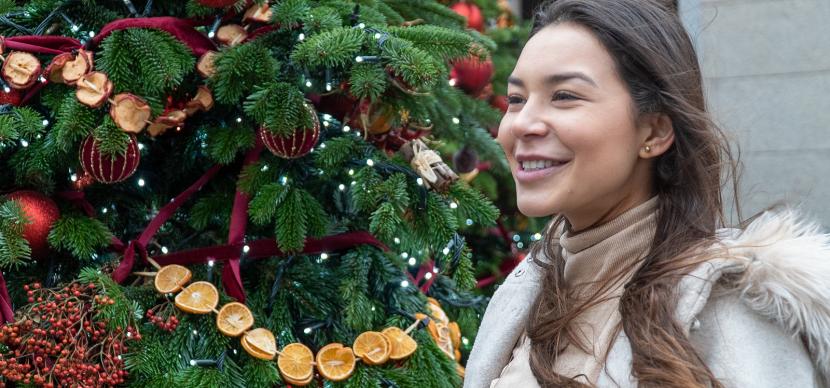Strange words in old christmas songs lyrics

Music is a great way to expose yourself to new English expressions, especially since a lot of countries listen to English-language music even where English isn’t the primary language. Although the English found in some songs is not always grammatically correct, it’s a great way to get used to native accents and practice your listening skills.
Let’s take a look at some Christmas songs lyrics and get ourselves in the Christmas music mood as we learn some new expressions. Many traditional Christmas songs were written many years ago and use words a bit differently than they would be used today, so sometimes these can be a bit tricky!
We've prepared some exercises with christmas songs in youtube. Have a look!
It's the Most Wonderful Time of the Year - lyrics
This song was first recorded and released by Andy Williams in 1963 and has since became one of the most famous Christmas classics. We’ve written all the lyrics below, but some of the words repeat again at the end of the song.
It's the most wonderful time of the year,
With the kids jingle belling
And everyone telling you, "Be of good cheer!"
It's the most wonderful time of the year.
It's the hap-happiest season of all,
With those holiday greetings and gay happy meetings
When friends come to call.
It's the hap- happiest season of all.
Jingle belling – A jingle bell, or sleigh bell, is an instrument commonly associated with winter and Christmastime because many years ago they would be attached to horse-drawn sleighs in the snow so that people could hear them coming. Although “jingle bell” is a noun, not a verb as used in the song, English words are very flexible, especially in songs and poetry, so the lyricist has invented this usage to mean “playing with sleigh bells.”
Be of good cheer! – “Good cheer” is a feeling of happiness (although a cheer would be the excited shout you make when you’re happy). “Be of good cheer” is a little old-fashioned, but it means, “Have fun and enjoy yourself!”
Hap-happiest – In order to fit the rhythm of the song, the first syllable of the word “happy” is repeated
Gay happy meetings – Many Christmas songs include the word “gay,” an old word for “happy” that has taken on a different meaning in recent years.
Come to call – “To call on someone” used to be a popular way of saying “to visit someone.” When friends come to call, they are stopping by for a visit.
There'll be parties for hosting,
Marshmallows for toasting,
And caroling out in the snow.
There'll be scary ghost stories
And tales of the glories of
Christmases long, long ago.
Caroling – A carol is a song of praise or joy, and nowadays is usually used to refer to a song sung at Christmas. A carol is the song sung, and to carol or to go caroling is to sing these songs.
Ghost stories – Although this was popular in Victorian times, telling scary stories has gone out of fashion at Christmastime. One exception is the famous A Christmas Carol by Charles Dickens (which, despite its name, is a novella or mini nobel, and not a song!)
It's the most wonderful time of the year.
There'll be much mistletoeing
And hearts will be glowing
When loved ones are near.
It's the most wonderful time of the year.
Mistletoeing – Mistletoe is a plant that is traditionally hung at Christmas; people that meet underneath it are expected to kiss. Like “jingle belling,” this usage as a verb has been made up. What do you think this action might look like?
Hearts will be glowing – To glow means to shine brightly, usually referring to a light or a fire. However, a person can glow as well, when they are very happy or embarrassed and their cheeks turn red. Hearts that are glowing are not actually letting out light; it’s a way of saying that everyone will be happy.
Have Yourself a Merry Little Christmas - lyrics
This song was first introduced by Judy Garland in the musical Meet Me in St. Louis in 1944. Frank Sinatra recorded a version with slightly altered lyrics that has become the most popular recording. In honor of Frank Sinatra’s 100th birthday tomorrow, December 12, 2015, here are the lyrics as sung by him.
Have yourself a merry little Christmas.
Let your heart be light.
From now on,
our troubles will be out of sight.
Let you heart be light – A heavy heart would have lots of worries. However, if you let your heart be light, you’re being happy and thinking positively. Christmas is the time to be merry!
Our troubles will be out of sight – Along the same lines as being light-hearted, this line is saying that only good things will happen; we won’t let our problems bother us.
Have yourself a merry little Christmas.
Make the Yuletide gay.
From now on,
our troubles will be miles away.
Yuletide – Yuletide is the period of time around Yule, which is an old word for Christmas and the Christmas season.
Miles away – Miles are usually a measurement of physical distance, but here are used metaphorically to mean that any troubles or problems will be far away and not important.
Here we are as in olden days,
Happy golden days of yore.
Faithful friends who are dear to us
Gather near to us once more.
Olden – Olden is related to the word old, and a somewhat formal way of saying “from a long time ago.” It’s most commonly used in the expressions olden days or olden times.
Yore – Another word you hear commonly in Christmas songs, this is an old word meaning “time long past.”
Through the years
We all will be together,
If the Fates allow.
Hang a shining star upon the highest bough.
And have yourself a merry little Christmas now.
The Fates – The Fates were the three goddesses from Greek and Roman mythology who controlled human destiny. In poetry, they’re often used to represent fate or destiny – things that are going to happen to someone – even though modern audiences don’t actually believe in the goddesses themselves.
Bough – A bough is a branch of a tree. (The word bough rhymes with now)
Rudolph the Red-Nosed Reindeer - lyrics
The character of Rudolph first appeared in a 1939 booklet written by Robert L. May, and was written into a song by Johnny Marks, May’s brother-in-law, in 1949. Before that, the names of Santa’s eight reindeer had been decided by Clement Clarke Moore’s popular poem A Visit from St. Nicholas, otherwise known as ‘Twas the Night Before Christmas. Rudolph became the ninth, and has been an important part of Christmas tradition ever since.
You know Dasher, and Dancer,
And Prancer, and Vixen,
Comet, and Cupid,
And Donner and Blitzen,
But do you recall
The most famous reindeer of all?
These are all the names of the other reindeer as they appeared in Moore’s famous poem.
Rudolph the red-nosed reindeer
Had a very shiny nose
And if you ever saw it
You would even say it glows.
Red-nosed – in English, you can often turn a body part into a past participle to use as a description: big-nosed, long-legged (pronounced “long leg-ged”), short-armed, etc.
All of the other reindeer
Used to laugh and call him names:
They never let poor Rudolph
Join in any reindeer games.
Call him names – “To call someone names” is another way of saying “to make fun of someone.” You give them mean names that they probably don’t like!
Then one foggy Christmas Eve
Santa came to say:
“Rudolph, with your nose so bright,
Won't you guide my sleigh tonight?”Then how the reindeer loved him
As they shouted out with glee,
“Rudolph the red-nosed reindeer,
You'll go down in history!”
Glee – Glee is an old word for “extreme happiness.” We don’t use it very much anymore, although you might recognize it as the name of a TV show. This is because “glee clubs” are choral groups, often attended as an afterschool activity in schools.
Go down in history – It might be easier to understand “go down in history” as “be written down in history books.” This means that someone or something will be remembered for a specific reason.
All I want for Christmas is you - lyrics
I just want you for my own
More than you could ever know
Make my wish come true
All I want for Christmas is youI won't ask for much this Christmas
I won't even wish for snow, and I
I just wanna keep on waiting
Underneath the mistletoe
Mistletoe – it's an evergreen plant, placed on top of doors or ceilings during Christmas. it is said that two people must kiss everytime they meet undeneath the mistletoe.
I won't make a list and send it
To the North Pole for Saint Nick
I won't even stay awake
To hear those magic reindeer click
Saint Nick – Santa Claus is also known by the name of Saint Nicholas. Nick here is an abbreviation of his full name.
'Cause I just want you here tonight
Holding on to me so tight
What more can I do
Oh, Baby all I want for Christmas is you
Carol of the bells - lyrics
Hark how the bells,
Sweet silver bells,
All seem to say,
Throw cares away
Hark: This archaic word means to pay close attention
Christmas is here,
Bringing good cheer,
To young and old,
Meek and the bold.
Meek: The lyrics are comparing both, people who are brave (bold) and people who aren't as much (meek)
Ding dong ding dong
That is their song
With joyful ring
All caroling.One seems to hear
Words of good cheer
From everywhere
Filling the air.Oh how they pound,
Raising the sound,
O'er hill and dale,
Telling their tale.Gaily they ring
While people sing
Songs of good cheer,
Christmas is here.Merry, Merry, Merry, Merry Christmas,
Merry, Merry, Merry, Merry Christmas.
 617 275-5955
617 275-5955




